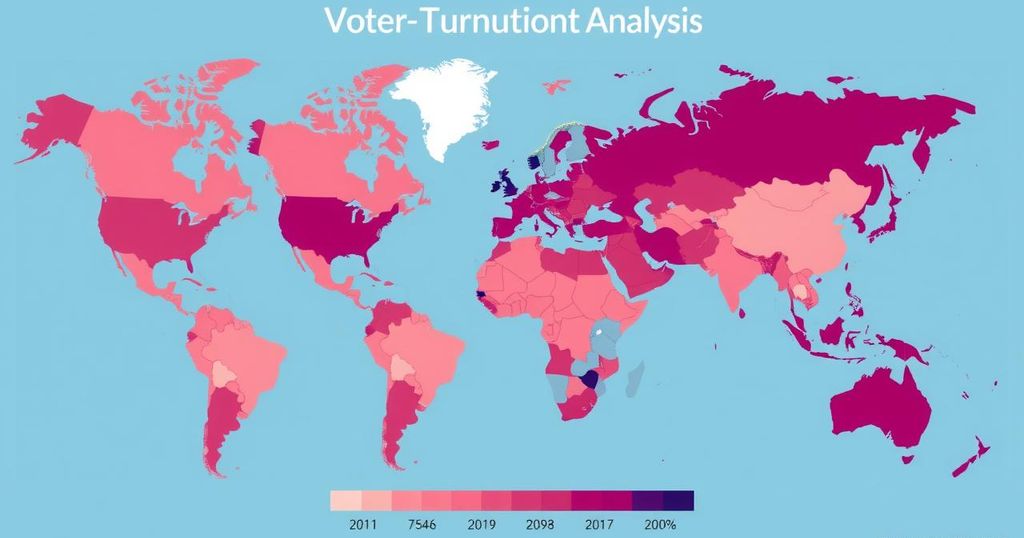In 2024, over 60 countries participated in elections, representing nearly half of the global population. Economic concerns predominated voter priorities, leading to significant electoral shifts and challenges for incumbents worldwide, including notable defeats for established leaders in several nations. The article reflects on the implications of these elections for democracy, highlighting how immediate issues often eclipse long-term considerations like climate change.
The year 2024 marked an unprecedented global voting phenomenon, with more than 60 nations casting ballots for their leaders—representing nearly half of the world’s populace. This collective electoral exercise highlighted humanity’s inclination towards self-interest and economic concerns over more profound, long-term issues such as climate change. Numerous leaders faced significant electoral challenges, as economic distress drove voters towards change, leading to notable victories and losses across the political spectrum.
In the United Kingdom, the Labour Party emerged victorious against the backdrop of economic hardships, reflecting a desire for immediate solutions rather than future sustainability. In the United States, President Joe Biden struggled to maintain support despite improvements in inflation, ultimately losing ground to Donald Trump. The elections demonstrated that, globally, voters prioritized their immediate economic wellbeing, punishing incumbents irrespective of past achievements.
Countries like India and South Africa witnessed established leaders suffering electoral setbacks, while in locales such as Bangladesh, civil unrest revealed a growing disillusionment with leaders accused of manipulating democratic processes. Contrarily, Trump’s win in the U.S. and the rise of populism elsewhere illustrated competing narratives within democracies regarding political efficiency and accountability.
The situation in Russia exemplifies the distortion of democracy, as President Vladimir Putin maintained power through means that subvert electoral integrity. The juxtaposition of electoral successes and failures across various countries underscores a key lesson: democracies, despite their complexity, remain reflections of their populations’ hopes, fears, and immediate concerns.
Looking ahead, the interconnectedness of global politics poses a challenge, especially regarding foreign policy decisions influenced by electoral outcomes in major democracies. The outcome of the 2024 elections will resonate on a global scale, shaping not only national landscapes but also international relations, particularly in contested regions such as Ukraine. Ultimately, while the electoral participation signifies progress for democracy, it also underscores the essential vigilance required to ensure elections uphold the tenets of genuine democratic practices.
Thus, democracy’s robust demonstration in 2024 serves as a reminder of its potential while also highlighting the ongoing struggles against populism, economic instability, and the vulnerabilities posed by autocratic regimes.
The article discusses the global electoral landscape in 2024, where an unprecedented number of nations participated in voting processes, reflecting a historic moment in democratic engagement. It examines how immediate economic concerns overshadowed long-term issues, such as climate change, influencing voter behavior in various countries. The narrative highlights significant electoral victories and defeats, portraying the evolving dynamics of political leadership amidst an increasingly interconnected world.
The global elections of 2024 underscored a critical moment for democracy, illustrating both its resilience and fragility in the face of economic challenges and populist movements. Voter behavior leaned towards immediate interests over long-term societal goals, with many incumbents facing repercussions for economic dissatisfaction. As these electoral outcomes shape international relations, particularly in conflict zones, they also present an opportunity for democratic ideals to further evolve. The lessons from this year serve as a call to action to ensure that democracy remains a vibrant and effective mechanism for representation and accountability.
Original Source: edition.cnn.com







